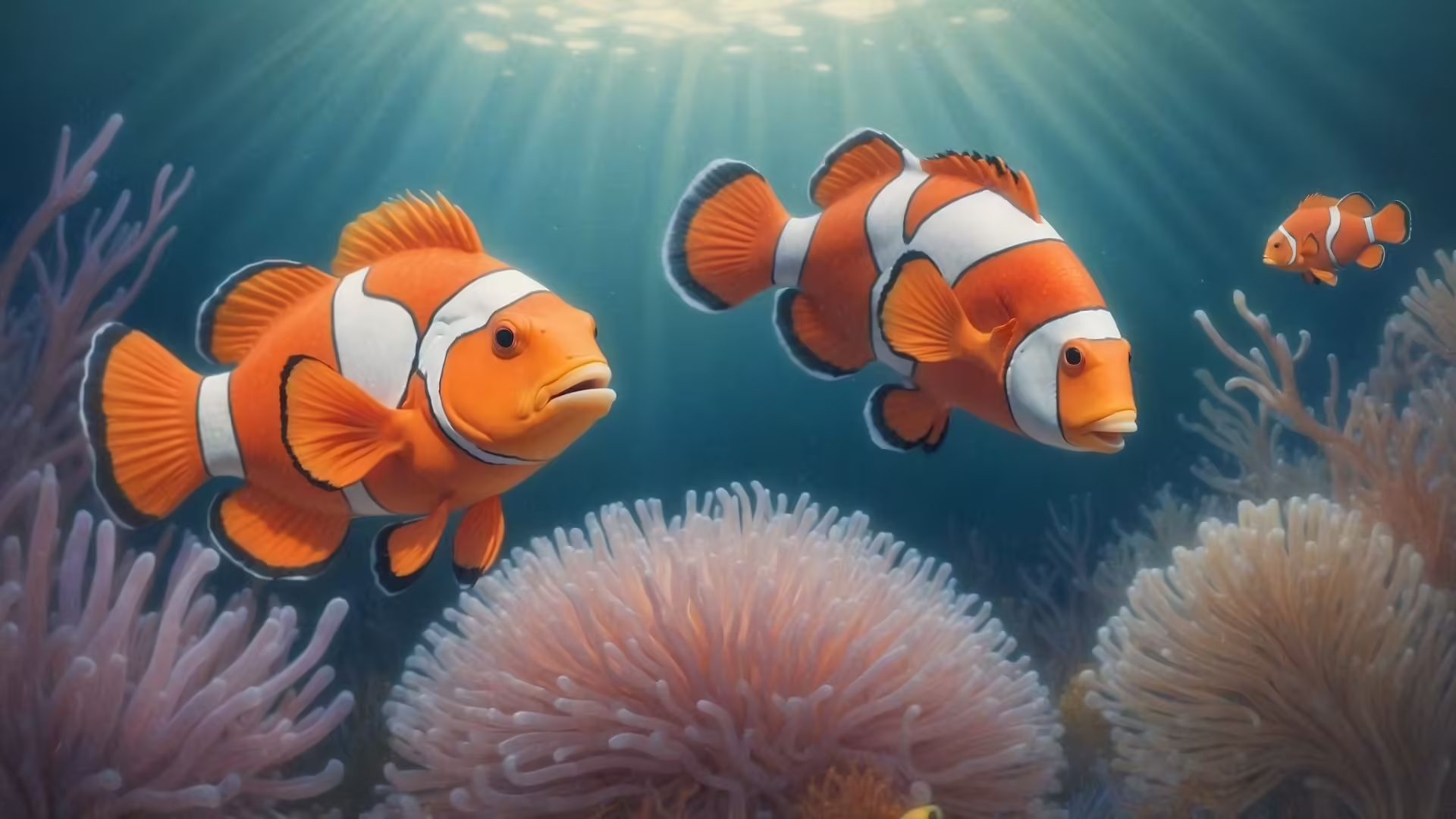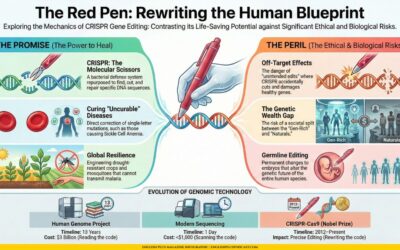The Gist
What Is Symbiosis?
Symbiosis refers to the close interaction between two or more species that live near or within each other, forming a relationship that affects their survival. The term comes from Greek, meaning “living together.” While some species rely on these relationships for survival, others use them as an opportunity to thrive in challenging environments.
The Three Main Types of Symbiosis
Mutualism: Everyone Wins
In mutualism, both species benefit from the relationship. Think of bees and flowers—bees collect nectar to make honey, and in return, flowers get pollinated, helping them reproduce. Another example is the clownfish and the sea anemone. The clownfish finds protection among the anemone’s stinging tentacles, and the anemone benefits from the fish cleaning its surface and scaring away predators.
Commensalism: One Benefits, the Other Isn’t Bothered
Commensalism happens when one species benefits while the other is neither helped nor harmed. A classic example is barnacles that attach to whales. The barnacles get a free ride and access to nutrient-rich waters, while the whale carries on unaffected. Similarly, some birds build nests in trees without impacting the tree in any meaningful way.
Parasitism: One Benefits, the Other Suffers
In parasitism, one species benefits at the expense of the other. A common example is fleas on a dog. The fleas get food by feeding on the dog’s blood, but the dog suffers from itchiness and irritation. While parasitism may sound harsh, it’s just another way life has evolved to maintain balance within ecosystems.
Real-Life Symbiosis: Beyond Nature Documentaries
Symbiosis isn’t limited to the wild—it plays a crucial role in human life too. Ever heard of the friendly bacteria in your gut? That’s a form of mutualism. These bacteria help us digest food and, in return, they get a cozy place to live and feed. Even cleaner fish that nibble parasites off larger fish have their human equivalent—think of those tiny fish in spas that clean your feet! Symbiotic relationships remind us that cooperation isn’t just for nature; it’s essential to our well-being too.
The Role of Symbiosis in Ecosystems
Symbiosis contributes to the health and stability of ecosystems. By fostering cooperation, these relationships help species thrive in ways they couldn’t on their own. Pollinators like bees ensure plants can reproduce, contributing to the food chain. Coral reefs rely on symbiotic algae to survive, and in turn, reefs provide shelter for countless marine species. Without symbiosis, many ecosystems would collapse, highlighting how interconnected life on Earth truly is.
Can Symbiotic Relationships Change?
Interestingly, not all symbiotic relationships are fixed. Some species switch roles depending on environmental changes. For example, certain plants can shift from mutualism to parasitism when conditions become less favorable. This flexibility demonstrates how adaptable life can be, finding ways to survive even when circumstances change.
Lessons from Symbiosis for Human Life
There’s a lot we can learn from symbiosis. Cooperation, balance, and mutual benefit are principles we can apply to our relationships, work environments, and communities. In a world that often emphasizes competition, nature reminds us that collaboration can be just as powerful. Whether it’s sharing resources or supporting one another, symbiosis shows us that thriving together beats struggling alone.
Final Thoughts
Symbiosis teaches us that survival isn’t always about being the strongest or the fastest—it’s about working together. In nature, cooperation builds resilience and allows life to flourish in even the toughest conditions. And that’s a lesson worth taking to heart. So, the next time you see bees buzzing around flowers or fish cleaning coral reefs, remember that nature’s most powerful force
Let’s Talk
Symbiosis really makes you think, doesn’t it? It’s like nature’s ultimate lesson in teamwork. We tend to think that survival is all about competition, but symbiosis flips that idea on its head. It shows us that life thrives when species cooperate—even if that cooperation looks a little odd, like fish nibbling parasites off a shark or birds hanging out on a buffalo’s back. And let’s be honest, sometimes humans aren’t too different. Think about it: ever had a friend who “borrowed” your Netflix password, and in return, they brought snacks to every movie night? That’s mutualism right there.
What’s cool about symbiosis is that it’s not always about fairness—sometimes just one side benefits, and that’s okay too. Ever given someone a ride and gotten nothing in return except the satisfaction of helping out? That’s kind of like commensalism. You weren’t harmed, but someone else benefited. It’s a reminder that not every good deed has to come with a reward. Sometimes just being part of a connection is enough.
And then there’s parasitism. Okay, this one sounds bad, but it’s part of life too. We’ve all dealt with “parasitic” situations—maybe a coworker who takes credit for your ideas or a houseplant that demands constant attention but refuses to thrive. Parasitism exists not just in the wild but in human relationships too. The challenge is figuring out when to draw the line and stop feeding the parasite. Ever had to do that? It’s not easy, but sometimes it’s necessary.
What’s fascinating is how symbiosis teaches us that relationships can change depending on circumstances. A partnership that starts off as mutually beneficial can turn parasitic if one side gives more than they get. It’s all about balance. Maybe that’s the biggest takeaway—whether you’re a fish cleaning a bigger fish or a person in a friendship, it’s important to check in and make sure the relationship still works for both sides. Are you giving too much? Are you taking too much? Nature doesn’t judge—it just adapts. And that’s something we can learn from too.
Symbiosis also reminds us that we’re all part of a larger ecosystem. It’s easy to think of ourselves as independent, but the truth is, we rely on others more than we realize. Ever think about how many unseen symbiotic relationships make your day easier? From the barista who makes your coffee to the farmers who grow your food, life is full of tiny connections that keep things running smoothly. Even those friendly bacteria in your gut are part of the equation. It’s humbling, isn’t it?
So, here’s a question for you: What symbiotic relationships do you have in your life right now? They could be obvious ones, like work partnerships, or subtler ones, like a neighbor who always waters your plants when you’re away. And how do you know when it’s time to adjust those relationships—whether to give more, ask for more, or maybe even step away? Nature has a way of finding balance, and maybe we can too, if we pay close enough attention.
Let’s Learn Vocabulary in Context
Symbiosis introduced us to some useful words and phrases that pop up in both nature and our daily lives. Let’s break them down and explore how they were used in context and how you can apply them to everyday conversations.
First up is mutualism. This describes a relationship where both parties benefit, like bees pollinating flowers while collecting nectar. You might say, “Our carpool is a kind of mutualism—he drives, and I cover the gas.”
Commensalism is when one side benefits while the other is unaffected, like birds nesting in trees. Imagine a situation where your friend crashes on your couch every weekend. “It’s pure commensalism—he gets a place to sleep, and I don’t mind.”
Then there’s parasitism, where one side benefits at the expense of the other. We’ve all met someone who drains our energy without giving anything back, right? “That coworker’s behavior feels like parasitism—she takes all the credit for group projects without doing any of the work.”
Symbiosis itself is a big one. It refers to close, long-term interactions between two species. But it’s not just for biology—you can use it for relationships too. “Our friendship feels like symbiosis—we support each other through thick and thin.”
Next, ecosystem refers to a community of living things interacting with each other and their environment. Think of your office or your social circle as a kind of ecosystem. “Our team works like a balanced ecosystem—each person has their role, and everything flows smoothly.”
Pollination is a specific example of mutualism, where bees help flowers reproduce. We can use it metaphorically too, like when ideas spread between people. “The brainstorming session was great—everyone was pollinating each other’s ideas.”
Adapt is another essential word. It means adjusting to new conditions, something both humans and animals need to do all the time. “I had to adapt to remote work, but now I love the flexibility.”
Balance is key in any relationship, especially in symbiosis. In life, we all need to find balance between work, rest, and relationships. “I’m trying to find a better balance between work and downtime.”
Cooperation is the act of working together toward a common goal. Whether in nature or at work, things run more smoothly when there’s cooperation. “The group project only succeeded because of everyone’s cooperation.”
Lastly, connection is what holds everything together in a symbiotic relationship. We thrive on connections, whether with nature, people, or ideas. “It’s amazing how a simple conversation can create a meaningful connection.”
Here are a couple of questions to reflect on: What’s one relationship in your life that feels like mutualism? And where do you think you need to adapt more to find better balance?










0 Comments